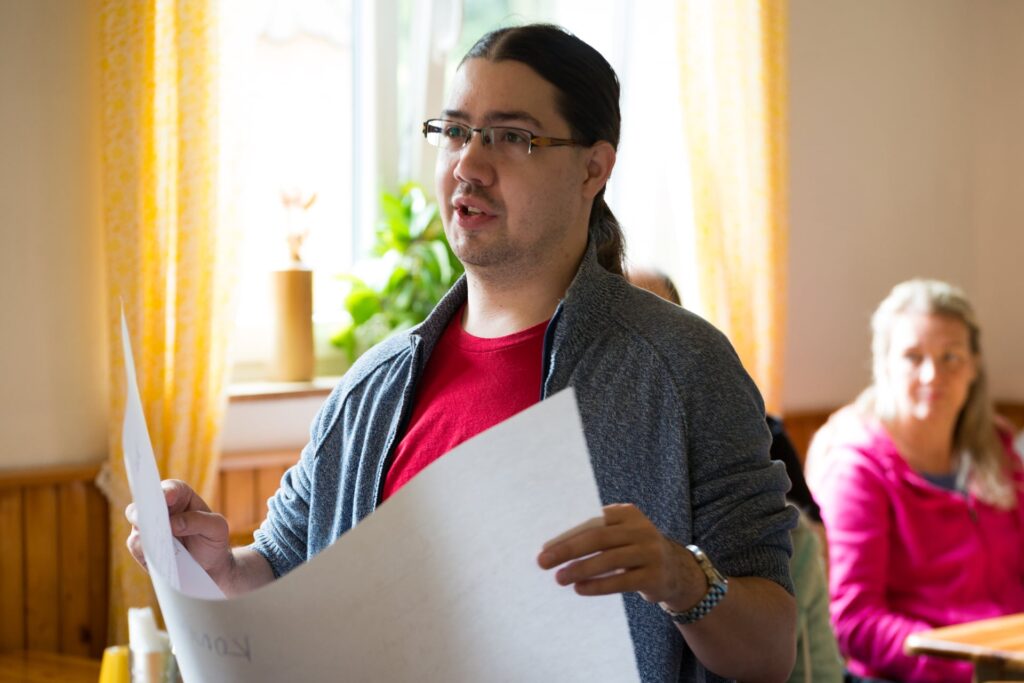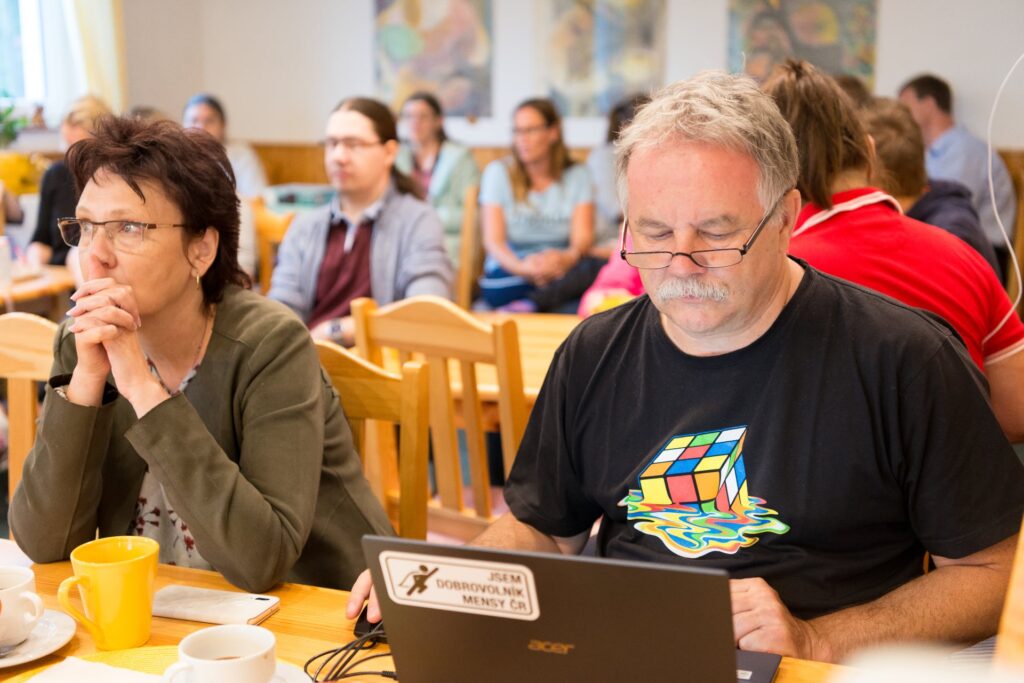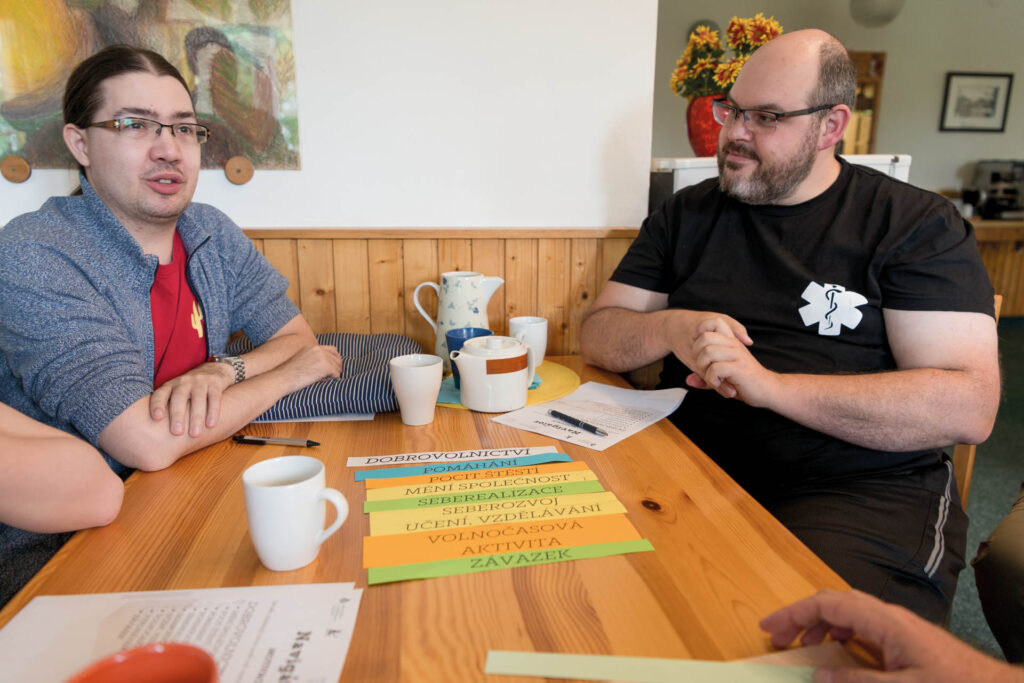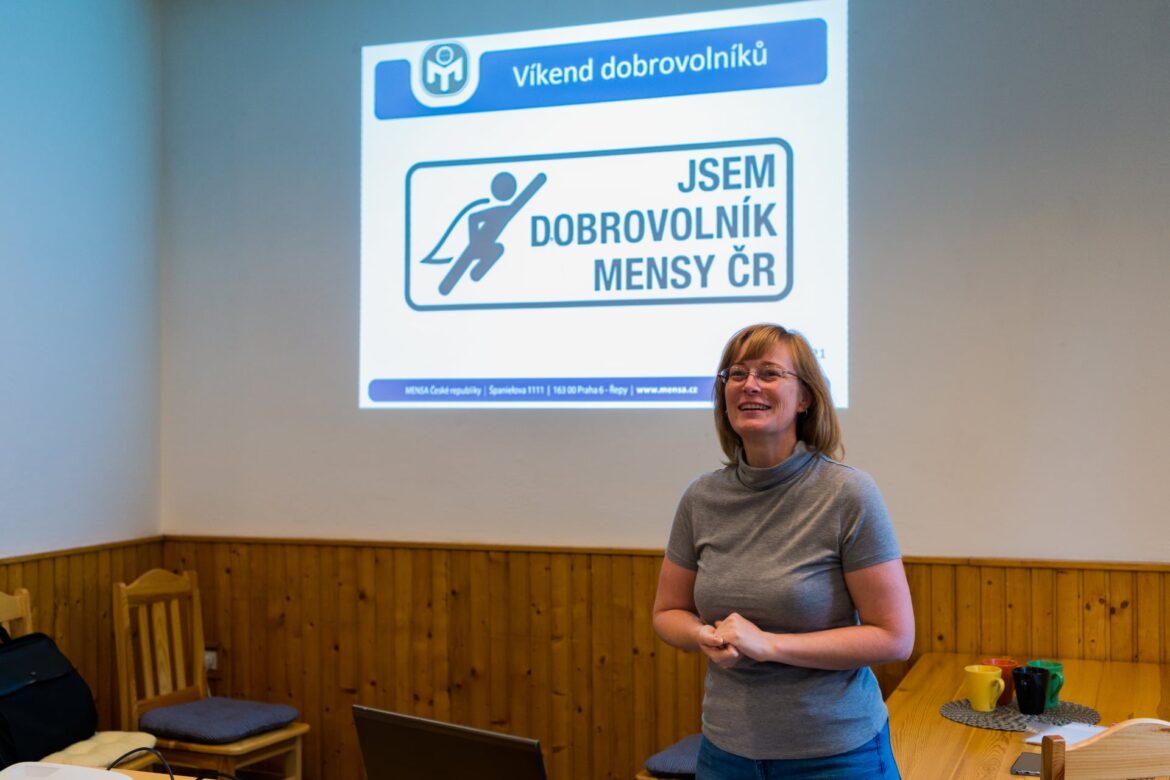
mensanthropist [ men-san-thruh-pist ] noun
a person, who actively participates in fulfilling one of Mensa’s objectives by fostering and utilizing intelligence for the benefit of humanity
For the tenth episode of this series, I decided to reflect a little more broadly on volunteering. The work of volunteers, that is, lending a hand to a common cause without remuneration, is something that no non-profit organization could exist without, whether it is saving hungry children in Africa or just helping to entertain a few people with common interests in their free time. Even entertainment, if it is to be organized, needs some work. Even a non-profit, whose operation is nowadays fully provided by paid employees, had to start somehow. Someone had to find the first sponsor in their spare time, convince a few other people that it makes sense to support such an activity.
What makes some of us get up and go work on something for others, instead of sitting in front of the TV, reading a book, playing games, or even sports? Why are we willing to work hard sometimes late into the night for free after we have returned home to our families after eight or more hours of paid work? How is it that we enjoy it and do it again and again? And what does it take for this effort and energy not to go to waste, to make a difference?
The Volunteer Weekend, which took place this August and you could read about in more detail in the last issue of the Czech Mensa magazine, included a workshop that showed me that different individuals have different motives to volunteer. During the workshop, we worked in groups and had to agree on the order of importance of our motives. We really didn’t do very well because something different was more important to each one of us. But we got to know each other’s motives through this.

To learn more about the different motives of the volunteers, I approached current active Mensa volunteers with a survey about three questions. In it, I asked what was their first impulse, what keeps them volunteering, and what impact they think their volunteering has on society as a whole.
Prior to writing this article, interesting responses arrived from nine people, which only reinforced my findings from the volunteer weekend. You can read the full selected responses at the end of this article. And if you also volunteer but didn’t complete the survey, you can still do so at https://mensa.click/kv. It might be useful, for instance, for a future installment of this series…
First impulse is different from long-term motivation, though they are related.
As I would expect, because it is true in my case, the first impulse to volunteer is very often something else than what then keeps one volunteering.
For example, someone decides to become a better person, another meets volunteers at an event and is impressed by how much fun the volunteers are having doing the work. In her response to the survey, Milada said she was brought up to volunteer and has been volunteering since she was 15 years old. Hana Kotinova wrote that she has always been the helping kind of person. A respondent who did not wish to be named wrote: „I was informed by Kubeš and Sedláček.“
A strong first impulse is what helps nonprofits recruit new volunteers. But it’s rarely just one thing; it‘ often a confluence of various circumstances. Something is missing, something derails or intrigues us, something succeeds or fails. We may be nudged to do it by someone else we trust and respect. Or a politician who drives us crazy.

Martin Sedláček, the current chairman of Mensa ČR, got involved at the very first event, which was the General Assembly in 2009, because volunteering came to him as a natural and obvious thing. Tomáš Poláček, on the other hand, was infected by the atmosphere of the community around the Open Gate School, where the emphasis is on social responsibility. He says that „seeing the examples around you – it makes you so energized that you can’t do otherwise.“
All motives and impulses to volunteer have one thing in common. It is the role of other people. It is our innate need to be part of society, to have a (good) impact on it. We all have this need within us, it’s just that some of us face some scruples – to start a new activity, to make contact with another person, to speak in public, etc. But in the end, it’s not much more difficult than getting out of bed in the morning. We often don’t want to do that either, but as I heard one psychologist say, „The easiest way to get up is just to get up.“
If you identify with any of the long-term motives described below, maybe the first impulse for you will be that the power goes out in the evening and you say, „How to liven up the evening?“ Or maybe you meet a new Mensan at a meeting of a local Mensa group in a pub somewhere, and after his answer to the question „What do you do in your spare time?“ they follow: „Do you want to help me with that?“
In the end, important won’t be what gets you started, but what makes you keep going.
Volunteering is as contagious as anything you love to do and are visibly passionate about. It’s easy to get carried away or offer a helping hand. One time, one day, one event. But nonprofits looking for volunteers are wondering how to convince someone to stay involved long-term. We who want to help, for example, often worry about whether we can stick with it, whether we can promise long-term help, so that we don’t disappoint.
The motives that keep us going stem from our individual needs. At the aforementioned weekend workshop, we gave them names like helping, self-development, self-realization, education, commitment, feeling happy, or changing society. Then we tried to rank them in order of importance, but we struggled quite a bit as everyone advocated for theirs.
Because volunteering brings a different value to each of our lives. It often fills a hole we have not been able to fill with something else.
Some people just try to fill their spare time with volunteering when they would otherwise have nothing to do, popularly speaking. Others are simply proud to be part of a team, a group such as Mensa.

A lot of people see it as a way to learn something new that they don’t yet know enough to do for a living, but expect that their experience as a volunteer in that area could open the door to new job opportunities. This is quite common especially in the west. You actually do get paid for the work you do for free – with the experience you gain. Or I can put it the other way around – you pay for your professional education with your work instead of money.
The first large-scale volunteering I got involved in 25 years ago was the formation of a club – a registered civic association – that brought people with a particular common interest together. My first impulse was the idea that as an official organisation we could get sponsors, have official premises and organise events. Initially, I was kept there by the gratitude of the members who were being helped through our activities. Later it was the recognition for what I was doing and that more and more people knew who I was. Later the time I spent with friends on a regular basis took over. It was enough to know that we were doing something good together for other people. With hindsight, though, I realized that the seven years I was active in the club were mostly a priceless education for me, and I still benefit from what I learned during those times.
Whether your own motivation is a noble sense of responsibility to society, a desire to learn something new, or just a simple need to tickle your ego with praise for good work from others, I have great news for you. The benefits are usually there all, no matter which one is your main motive or what others are doing it for.
What will help all of humanity?
Well, we have decided to put our hand to work and do good, we even have the motivation to keep doing it for a long time. But how do we ensure that the good we do as individuals and as a group has a global significance, an impact on the whole society, on the whole humanity?
That is what organizations are for. Even if I don’t come up with anything new and groundbreaking myself, or become the leader of a large movement, I can at least join a group of others who have already started an activity. It is enough for me to consider it good. Then the whole group will act in unison and will have the more influence the bigger it is.

In the Talmud it says: „Whoever saves a single life is considered by scripture to have saved the whole world.“
It may be Jewish wisdom, it may be even older, but it works mathematically. If every single person somehow helps to improve the life of even one other person, the life of all humanity will be improved. All it takes is to help the one that no one else has helped. In addition, the person who helps will also improve his or her own life as a volunteer, because he or she will also benefit from volunteering.
So if you want to help humanity with your intelligence, if you have the heart of a mensanthropist, you don’t necessarily have to come up with your own activity. Just get involved in some of the ones that somebody has already started, and the impact on humanity will grow naturally as the activity grows. And while you’re reading this magazine, why not start in Mensa and pick a SIG that is close to your heart. You can find them on the web at mensa.click/sig.
Responses to the survey:
What made you become a volunteer? What was the first impulse?
„Not going on a field trip alone, a lecture 😀 Or rather training on organizing? Something different each time, I didn’t become a volunteer by the first impulse, but by a sequence of events I organized for different reasons, until I suddenly realized that I was probably volunteering.“ – VlK
„The biggest motivation and inspiration in the beginning was participating in events/excursions that others organized. Finding out that it doesn’t require magical superpowers to organize an event, but with a little support, even a mere mortal (meaning Mensan) can do it, was extremely liberating. I remember M. Hladíková’s article about an excursion at the airport, the first walks of SIG111 or the competition in the library from Z. Kořínková at the first meeting I attended. The biggest surprise was that the first events I dared to actually organize were attended by nice and positive people (and one of my first excursions was held at the Olšany Cemetery).“ – Petra Holubová („Holubička“)
What keeps you volunteering? What does it bring you personally? Why do you stay with it and devote time to volunteering regularly?
„First of all, the inner feeling of joy from the meaningfulness of the activities. I also enjoy the new contacts and the overall broadening of horizons and experience.“ – Ing. Tomáš Poláček
„a) I have always been looking for an opportunity to learn something new and this is one of the ways to get a feel for certain things that one might like to do as a professional, but doesn’t have the necessary experience yet. b) Being extremely introverted, this is quite a nice opportunity to look for soul mates and draw them into my world a little bit at the same time, because I simply don’t dare to do other things.“ – Hana Kotinová
„Trying to support Mensa with my time and modest resources. Seriously, though – I get a lot of pleasure from proofreading the Mensa magazine, for example, when I catch some very inconspicuous scotch. And when planning events and preparing materials for the participants, there is usually a good atmosphere (even if in a hurry). You can enjoy short meetings with a lot of people in the cloakroom… And for those undecided potential volunteers: sometimes a volunteer has the opportunity to participate in events for free.“ – Kristýna Mothejzíková
„Self-development. Inertia. Diversification and synergy with business, family: when I get upset with business, I fix my mood or get inspired with volunteering, when I get frustrated with volunteering, I have a family. When we have different opinions in the family, discussion with friends unexpectedly helps. Knowing that I have an impact on something.“ – VlK
„I think it’s pretty generally true that volunteering brings a sense of purpose, and in my case it’s definitely true. Sometimes I don’t want to do the work, of course, but the sense of responsibility to complete the work always wins out, and also the fact that someone appreciates the work, even if indirectly.“ – Martin Sedláček
„I like the people and the children I work with and I feel comfortable with them.“ – Milada
What impact/benefit do you think (or hope) your volunteer work has for society or humanity as a whole?
„Cultivation of expression, connecting people with the same interests/goals.“ – Petr Štěpán
„I guess it’s like bees – when there are many of us and we share the same mission, we can do really great things. We learn new skills from each other, and each of us builds something nice within our capabilities – for nature and for a better life for people.“ – Ing. Tomáš Poláček
„Through various volunteer activities I try to fulfil my vision of what should also be part of education in schools.“ – Hana Kotinová
„I wish I could say something similar to the Miss World contestants about global peace and happiness for mankind, but I don’t feel like a swimsuit promenade. I hope that my volunteering and organizing events has a positive and inspiring effect on those particular people around me. On members and non-members of Mensa who are also part of that all-encompassing concept of humanity. I hope that maybe through my action they will also punch above their weight and organize something for others. And if they do, then my volunteering makes sense.“ – Petra Holubová („Holubička“)
